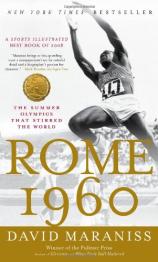Rome 1960: The Olympics That Changed the World
Review
Rome 1960: The Olympics That Changed the World
On August 8th the Summer Olympics of 2008 will commence in Beijing, China. It is an event trumpeted around the world, heavy with both athletic and political consequences. For months in the United States it has been heralded by television networks who are preparing with a zeal that normally accompanies nations going into battle. We will be inundated with full coverage once the games begin.
It is difficult to pinpoint with certainty when our obsession with the Olympics began. ROME 1960: The Olympics That Changed the World, by David Maraniss, suggests by its title the answer to that question. While other Olympic years may have produced more dramatic individual moments, the events of the 1960 Olympics, with its heroes and heroines during the 18 days in Italy, occurred against the backdrop of the Cold War and the changing face of amateur athletics. The saturating coverage of today's Olympics stands in stark contrast to coverage limited by technology and money to a daily recap using film flown across the Atlantic Ocean in commercial aircraft. In 1960 satellite coverage was only a dream.
Marannis shows a remarkable ability to place the athletic experience in the context of the contemporary events shaping the world. World politics have played a crucial role in the modern Olympics, and he is comfortable in discussing both the athletic and political consequences of the Olympics.
ROME 1960 is told through the accomplishments of a wide range of athletes, some whose contribution ended with the Olympic games of 1960 and others who played important roles thereafter. Rafer Johnson, the first African American to carry the U.S. flag into the Olympic stadium, would win the decathlon in 1960 and earn the designation as the world's greatest athlete. Like many of the African American sports figures of the 1960s, Johnson had to battle the evils of racism in America and the world. It would make his success more difficult but eventually more satisfying. Not as successful was Johnson's teammate, Ray Norton, who entered the Olympics with the title "world's fastest human" and left designated as "world's biggest flop." He finished last in the 100 meters and 200 meters, and caused the United States team to be disqualified in the 400-meter relay.
On the female side of the American track team, Wilma Rudolph would become a heroine. Growing up in a world of poverty, Rudolph was forced to miss part of a track season when she gave birth to a child out of wedlock. Her coach advised the media that she was suffering from appendicitis rather than publicly shame the young sprinter with news that she had given birth. Rudolph overcame multiple hardships to win three gold medals in Rome and become one of America's most popular and revered athletes.
While all Americans recognize heavyweight champion Muhammad Ali, some may be unaware that in 1960 he was light heavyweight Cassius Clay. He stormed through the Olympic boxing competition with the same braggadocio and style that he would later show in his professional career. In Rome, however, he avoided politics.
The Olympic basketball team of 1960, composed of college players and not professionals, swept through the games with ease. Led by future Hall of Famers Oscar Robertson, Jerry West and Jerry Lucas, the team was not seriously tested. It would be several Olympics before the rest of the world would catch up to America in the game invented by American James Naismith.
ROME 1960 is more than a story about athletes, though. The Cold War played a prominent role as America came to grips with the fact that the Russians were winning more medals and using this for propaganda purposes. For its part, the American government encouraged communist athletes to defect to the West and enlisted American athletes in that effort. Avery Brundage, president of the International Olympic Committee, fought a losing battle to keep politics and professionalism out of the Olympics. Marannis portrays Brundage as a man who maintained a vision of the games that was woefully unrelated to reality. In the tragedy of the Munich Olympics of 1972, this depiction would become painfully obvious to the world.
Marannis has done a superb job capturing the Olympic spirit both on and off the fields of athletic competition. While it is an easy cliché to end this review, it is nonetheless true that ROME 1960 is a gold medal-winning book.
Reviewed by Stuart Shiffman on April 27, 2011
Rome 1960: The Olympics That Changed the World
- Publication Date: July 14, 2009
- Genres: History, Nonfiction, Sports
- Paperback: 496 pages
- Publisher: Simon & Schuster
- ISBN-10: 1416534083
- ISBN-13: 9781416534082





